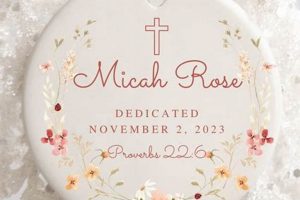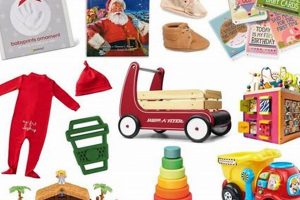The expression signifies presents regarded as most suitable for a female infant’s christening ceremony. These items are typically selected for their sentimental value, practicality, or potential to become cherished heirlooms. Examples include personalized jewelry, religious keepsakes, and items designed for early childhood development.
Selecting appropriate christening presents acknowledges the significance of the religious occasion and provides enduring mementos of this milestone. Traditionally, such gifts served as blessings and well wishes for the child’s future, often incorporating elements of faith, hope, and charity. Moreover, these offerings contribute to the establishment of lasting family traditions.
The following sections will elaborate on diverse present options, categorizing them based on their utility, spiritual relevance, and potential for personalization, assisting gift-givers in making informed decisions.
Guidance for Selecting a Memorable Christening Gift
The selection of a christening present requires careful consideration. The gift should reflect the solemnity of the occasion and serve as a meaningful keepsake for the child and family. The following guidelines aim to assist in identifying an appropriate and cherished offering.
Tip 1: Prioritize Sentimental Value: Gifts carrying personal significance or representing family heritage often resonate more deeply. Consider items that can be engraved with the child’s name, christening date, or a heartfelt message.
Tip 2: Consider Religious Significance: Items embodying faith-based symbolism, such as a cross pendant, a blessed rosary, or a beautifully illustrated children’s Bible, align with the ceremony’s purpose and spiritual nature.
Tip 3: Opt for Timeless Elegance: Select gifts crafted from enduring materials and possessing classic designs. Silver rattles, porcelain figurines, or high-quality blankets can become cherished heirlooms passed down through generations.
Tip 4: Ensure Practicality: While sentiment is important, a useful item can be equally appreciated. A well-made diaper bag, a comfortable baby carrier, or a set of soft organic cotton clothing demonstrates thoughtful consideration.
Tip 5: Explore Personalized Options: Gifts tailored to the child’s individuality, such as a custom-made storybook featuring the baby’s name or a hand-painted piggy bank, add a unique and memorable touch.
Tip 6: Factor in Parental Preferences: Whenever possible, discreetly inquire about the parents’ taste and needs. This ensures that the gift complements their lifestyle and preferences.
Tip 7: Set a Budget: Determine a comfortable spending limit before embarking on the search. The value of the gift lies in its thoughtfulness, not its monetary worth.
By adhering to these guidelines, one can confidently select a present that honors the christening ceremony and leaves a lasting positive impression.
The subsequent section will offer specific present ideas, categorized for easier browsing and selection.
1. Symbolic Religious Items
The inclusion of symbolic religious items as offerings during a female infant’s christening reflects the event’s core significance. These items serve as tangible representations of faith, acting as constant reminders of the spiritual commitment made during the ceremony. They are not merely decorative; they embody blessings and prayers for the child’s well-being and spiritual growth. The selection of such items is directly tied to the overall objective of presenting gifts that are meaningful and relevant to the occasion.
Examples of such items include, but are not limited to, miniature Bibles, rosaries designed for infants, and pendants featuring religious iconography. A silver cross pendant, for instance, symbolizes faith and protection and can become a cherished keepsake, worn throughout the child’s life. A carefully chosen children’s Bible, illustrated with age-appropriate stories and verses, provides an early introduction to religious teachings and fosters spiritual development. Each religious token should ideally align with the family’s specific faith tradition.
The value of religious items lies not only in their physical presence but also in the values they represent. They become enduring symbols of the christening day, strengthening the child’s connection to their faith. Selecting appropriate religious items requires careful consideration, ensuring the gifts are respectful, age-appropriate, and hold genuine meaning for the family. These objects are a fundamental component for marking the day the baby girl was officially received into the Christian community.
2. Personalized Keepsakes
Personalized keepsakes represent a significant category within appropriate tokens for a christening, imbuing the gift with a unique and sentimental value. They transcend generic offerings, demonstrating thoughtful consideration and creating a lasting connection between the giver and the recipient.
- Engraved Jewelry
Jewelry, such as a bracelet or pendant, engraved with the infant’s name, christening date, or a short, meaningful message, transforms a simple accessory into a treasured heirloom. This personalized touch elevates the gift, marking the occasion with a tangible and lasting reminder. The engravings serve as a constant link to the christening and the individuals who presented the gift.
- Custom-Made Books
A storybook featuring the child’s name, family members, and details related to the christening presents a unique and engaging gift. These books can be tailored to convey religious teachings or simply celebrate the child’s arrival into the family. The personal narrative element makes the book a cherished item, fostering a love for reading and creating a lasting memory of the christening.
- Personalized Photo Albums or Frames
A photo album or frame engraved with the child’s name and christening date offers a dedicated space for preserving memories of the special day. This gift encourages the family to document and cherish these early moments, creating a tangible legacy for the child to revisit in the future. The personalization transforms a standard item into a heartfelt tribute.
- Handmade or Customized Blankets
A blanket embroidered with the child’s initials, name, or a special symbol provides both comfort and sentimentality. Handcrafted blankets, in particular, convey a sense of care and personal investment. These items offer a practical and enduring keepsake that the child can cherish throughout their early years, serving as a constant reminder of the christening and the giver’s affection.
The incorporation of personalized elements into christening gifts significantly enhances their value, transforming them into treasured mementos that capture the essence of the occasion. These keepsakes provide enduring reminders of the event, strengthening familial bonds and creating a lasting legacy for the child.
3. Practicality and Utility
The consideration of practicality and utility is paramount when determining suitable christening offerings for a baby girl. A present, beyond its aesthetic appeal or sentimental value, ideally serves a functional purpose in the infant’s early life. The inclusion of practical items acknowledges the immediate needs of the child and provides tangible support for the parents. Choosing items that alleviate some burden on the parents is an expression of thoughtfulness. A well-chosen, useful gift is more likely to be appreciated over the long term.
Examples of practical christening presents include high-quality clothing sets in various sizes, addressing the infant’s rapid growth. A diaper bag equipped with essential supplies, such as wipes and changing pads, offers convenience for parents on the move. Nursery items, such as a sound machine or a baby monitor, contribute to the child’s comfort and safety. Selecting items crafted from durable, easy-to-clean materials enhances their utility and longevity. Gifting a subscription to a diaper service, a meal delivery program, or a professional cleaning service for the home provide welcome assistance during this transitional period.
The emphasis on practicality and utility does not diminish the significance of sentimental value. Instead, it offers a complementary approach to selecting meaningful christening presents. Prioritizing usefulness alongside heartfelt intent ensures that the offering is both appreciated and beneficial, demonstrating a well-rounded and thoughtful approach to gift-giving on this special occasion. The incorporation of practical items recognizes the realities of early parenthood, providing tangible support and contributing to the well-being of the child and family.
4. Heirloom Quality
The selection of appropriate christening presents for a female infant frequently involves considering items possessing heirloom quality. Such gifts are designed to transcend immediate utility, becoming lasting mementos passed down through generations. Their enduring value lies not only in material composition but also in sentimental significance, creating a tangible link between past, present, and future.
- Durable Materials and Craftsmanship
Heirloom quality items are typically constructed from robust materials such as sterling silver, high-grade porcelain, or durable hardwoods. Superior craftsmanship ensures the item’s longevity, resisting wear and tear over extended periods. Silver rattles, for example, are a classic christening gift, often meticulously crafted and designed for preservation. The material and construction inherently contribute to the item’s potential to become a family treasure.
- Timeless Designs and Styles
Items with heirloom quality often feature designs that are classic and enduring, transcending fleeting trends. A simple, elegant cross pendant in gold or a conservatively styled porcelain figurine exemplifies this quality. Avoiding overly trendy or novelty items ensures that the gift will remain aesthetically pleasing and relevant across different eras.
- Potential for Personalization and Engraving
The ability to personalize an item with engravings, monograms, or dates significantly enhances its heirloom potential. Adding the child’s name and christening date to a silver locket, for instance, transforms it from a generic gift into a uniquely meaningful keepsake. These personal touches solidify the item’s connection to a specific family and event, increasing its sentimental value.
- Connection to Family History and Tradition
Gifts with a clear connection to family history or religious tradition possess inherent heirloom value. A hand-stitched quilt featuring family emblems or a replica of a religious icon passed down through generations embodies this connection. Such items serve as tangible reminders of the family’s heritage, fostering a sense of continuity and belonging.
Therefore, the integration of heirloom quality principles into christening gift selection underscores a commitment to providing presents that are not merely ephemeral but are instead designed to become enduring symbols of love, faith, and family heritage. The consideration of materials, design, personalization, and historical connection allows for the selection of gifts that will be cherished for years to come, effectively transforming them into valuable heirlooms.
5. Monetary Contribution
Monetary contributions, while perhaps unconventional in traditional gift-giving, represent a practical and forward-thinking approach within the spectrum of suitable christening presents for a baby girl. This approach acknowledges the long-term financial needs associated with raising a child and provides a tangible benefit that extends far beyond the immediate occasion.
- Education Savings
Establishing or contributing to a 529 plan or other education savings account offers a significant advantage, enabling the family to accumulate funds for future educational expenses. Rising tuition costs necessitate early planning, and a monetary gift directed toward education can substantially ease the financial burden later in life. Such contributions demonstrate foresight and a commitment to the child’s long-term success.
- Trust Funds
A more formal approach involves creating or adding to a trust fund designed to benefit the child at a specified age. Trust funds offer greater control over the management and distribution of assets, potentially providing income or capital for specific purposes, such as higher education, homeownership, or business ventures. This mechanism safeguards the funds and ensures they are used responsibly in accordance with the grantor’s wishes.
- Investment Accounts
Direct contributions to an investment account, such as a brokerage account held in trust for the child, can provide long-term growth potential. While investment carries inherent risks, a well-diversified portfolio can generate significant returns over time, increasing the value of the gift. This approach requires careful consideration of investment strategies and risk tolerance, but offers the potential for substantial financial gains.
- Direct Contributions to a College Fund
Some families may have already established specific college funds or savings accounts. Contributing directly to these existing funds allows for streamlined management and avoids the complexities of creating new accounts. This approach simplifies the process and ensures that the monetary gift is immediately allocated toward its intended purpose: funding the child’s future education.
The decision to provide a monetary contribution as a christening gift reflects a practical and pragmatic perspective, prioritizing the child’s future financial well-being. While lacking the sentimental value of traditional keepsakes, such gifts offer a tangible and lasting benefit, alleviating financial burdens and empowering the child to pursue future opportunities. Selecting this option requires careful consideration of the family’s financial situation and long-term goals, ensuring that the contribution is aligned with their needs and priorities.
Frequently Asked Questions
This section addresses common inquiries regarding the selection of suitable christening presents for a female infant. These answers aim to provide clarity and guidance for gift-givers seeking to offer meaningful and appropriate tokens of celebration.
Question 1: What constitutes an “appropriate” price range for a christening gift?
The suitable price range varies considerably based on the giver’s relationship to the child and family. Close relatives and godparents typically offer more substantial gifts, while friends and acquaintances may opt for more modest presents. There exists no prescribed monetary value; the gesture’s thoughtfulness surpasses any fixed price point.
Question 2: Is it acceptable to inquire about the family’s preferences or needs before selecting a gift?
Direct inquiry is generally permissible and often encouraged. Discreetly ascertaining the family’s desires avoids redundancy and ensures that the present aligns with their specific requirements. Open communication is particularly valuable when considering larger or more personalized items.
Question 3: How can one ensure that a religious gift is appropriate and respectful?
Selecting a religious gift necessitates sensitivity to the family’s specific faith tradition and beliefs. Choosing items that align with their established practices and avoiding potentially controversial or divisive symbols is paramount. Consultation with clergy or religious advisors may provide further guidance.
Question 4: What are some alternatives to traditional christening gifts?
Alternatives to traditional gifts include contributions to a college fund, donations to a charitable organization in the child’s name, or the provision of services such as babysitting or meal preparation. These options offer practical assistance and demonstrate a commitment to the child’s well-being.
Question 5: How far in advance should a christening gift be purchased and delivered?
Ideally, a christening gift should be purchased well in advance of the ceremony to allow ample time for personalization, wrapping, and delivery. Aiming to deliver the gift at least one week prior to the event ensures that the family has sufficient time to prepare and avoids any last-minute stress.
Question 6: What constitutes appropriate etiquette for presenting a christening gift?
Presenting the gift with a card expressing sincere congratulations and well wishes is essential. A brief and heartfelt message acknowledging the significance of the occasion conveys respect and genuine sentiment. Direct presentation to the parents is preferable, whenever feasible.
Careful consideration of these questions facilitates the selection of a christening present that is both meaningful and appropriate, reflecting the gravity of the occasion and providing lasting value to the child and family.
The subsequent section will summarize the key considerations for selecting an appropriate christening gift.
Considerations for Selecting Exceptional Christening Presents
The preceding examination of “best christening gifts for baby girl” has illuminated the multifaceted aspects of present selection for this significant occasion. The analysis has emphasized the importance of balancing sentimental value with practicality, religious symbolism with personal expression, and immediate utility with long-term impact. Heirloom quality, the option for personalization, and the potential for monetary contributions toward the child’s future were all discussed as crucial elements.
Ultimately, selecting a christening present demands thoughtful deliberation and a sincere understanding of the family’s values and preferences. It is the giver’s intention, manifested through careful consideration and appropriate action, that transforms a simple object into a cherished memento of this pivotal moment in the child’s life. It is the hope of the giver, that such a token will endure, serving as a lasting reminder of faith, love, and the promise of a bright future.







